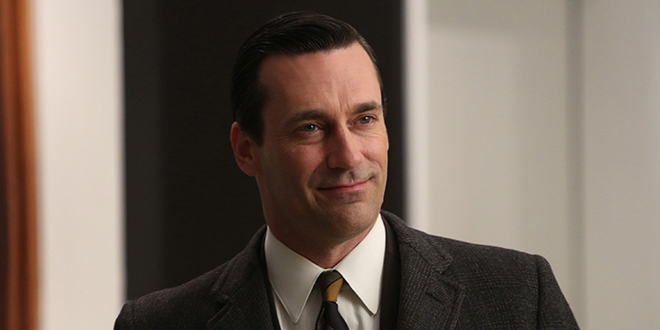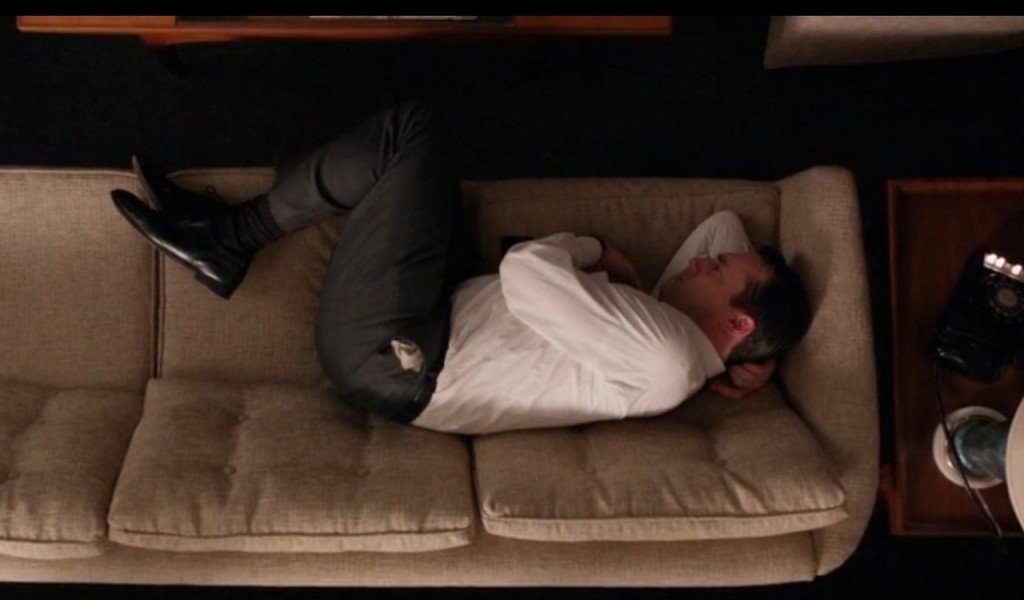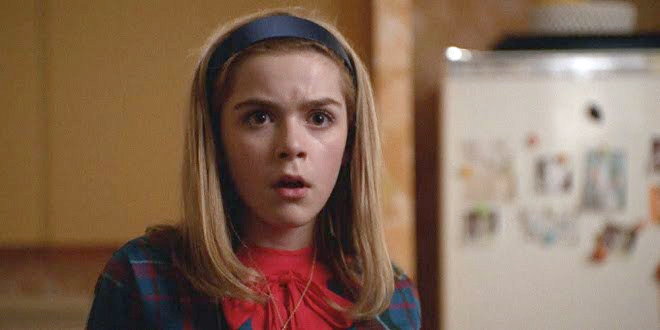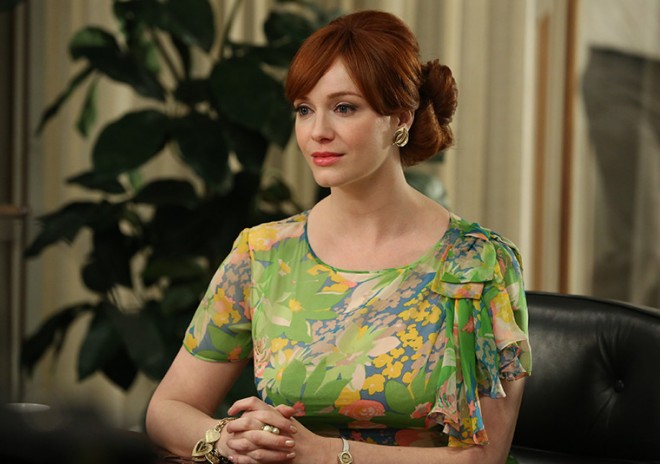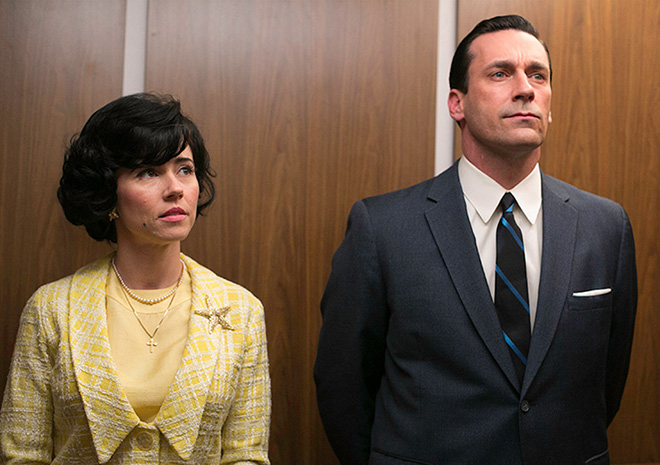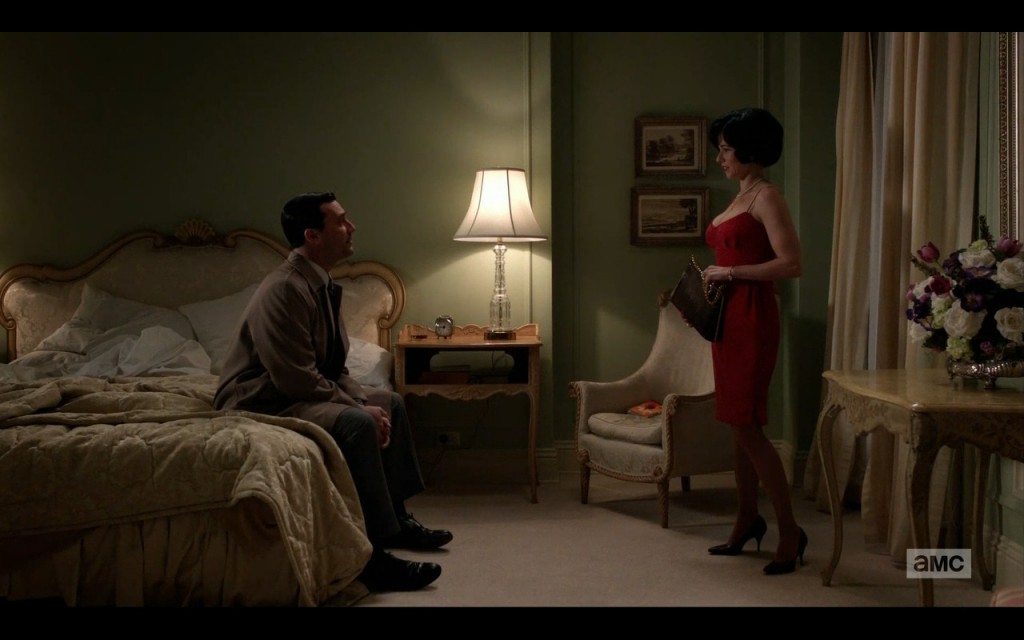Posts Tagged ‘Wired’
“Mad Men” thoughts, Season Seven, Episode 14: “Person to Person”
May 18, 2015I remain agnostic about whether Don made the ad, as I believe the show intends. At any rate, it’s largely immaterial. We’ve spent seven seasons watching Don grow, shrink, succeed, fail, move forward, stagger back, and generally struggle with his inability to fill the void inside him with things pulled in from outside, whether that’s money, sex, love, wanderlust, creativity, or industrial quantities of alcohol. There’s no reason, really, to assume the struggle would end when the show does — that Don’s grin marks, for certain, the beginning of a more grounded, more centered new life completely separate from the old one.
What’s more, an uncomfortable overlap between his current self and his ad-man past would in no way wipe out the losses and gains he experiences here. Don’s grief over Betty’s diagnosis and his subsequent realization that his absence from his children’s life is, to them, “normal life” is real. So is his litany of unforgivable sins, recited in the sardonic lilt that should be familiar to anyone who’s taken a similar vebal inventory of their failings and found the results to be a crippling psychological wound: “I broke all my vows. I scandalized my child. I took another man’s name and made nothing of it.” Don once told Peggy that despite seemingly having it all, he’s still gripped with a terrible worry: “That I’ve never did anything, and I don’t have anyone.” Crumpled by the payphone at the retreat, he’s realized his worry has come true. I envy anyone who doesn’t find this story, this show, completely devastating.
But it’s not just his collapse that remains real, but his catharsis as well. Sitting in the encounter group, he listens to a man named Leonard, a square in every respect, describe a life that’s very much like the ideal all-American one Don himself had at first tried to create before going on to constantly undermine and eventually destroy it. This, Leonard hasn’t done; it doesn’t matter. “I’ve never been interesting to anybody,” he says. “I work in an office—people walk right by me. I know they don’t see me. And I go home and I watch my wife and my kids—you know, they don’t look up when I sit down. It’s like no one cares that I’m gone. They should love me. Maybe they do, but I don’t even know what it is. You spend your whole life thinking you’re not getting it, people aren’t giving it to you, then you realize they’re trying and you don’t even know what it is.” He describes a dream that sounds like an ad, about living in a refrigerator, thrilling to the smiling faces he sees when people open its door and the light switches on until he realizes they’re not looking for him at all and the door swings shut. At this, Don stands, walks over, kneels down, and embraces the man, a total stranger, as they cry. In this moment he realizes there are many ways to Have It All, and that so long as you see this as your goal, they all leave you with nothing.
I reviewed the finale of Mad Men for Wired. This was a show, folks. This was a show.
“Mad Men” thoughts, Season Seven, Episode 12: “Lost Horizon”
May 4, 2015Joan has an even harder time accepting her reduced status as more pluribus than unum at the new office, though things seem fine, even fun, at first. She’s welcomed to work by Libby and Karen, two copywriters who specialize in campaigns targeting women—“If it’s in it, near it, or makes you think about it, we’re on it”—and whose approach to gender politics is connected women’s lib only by the coincidence of one of their names. “It’s not women’s lib, just a bitch session,” says Karen of the weekly girls’ night out to which they invite the newcomer. “We are strictly consciousness-lowering,” Libby jokes, and Joan’s smile practically radiates “I’m gonna like it here.” But by the end of the episode, the boys’-club condescension and harassment she’s subjected to by McCann execs like Dennis and Ferg Donnelly is such that she threatens to sic feminist icon Betty Friedan on the company unless they either put the kibosh on the creeps or cough up the cash she’s owed.
Being seen as part of a fundamentally faceless female horde is awful when it subjects you to undercutting, backstabbing, and grab-assing, but it’s a useful tool to strike fear in the hearts of men who watched said horde march through the streets of New York some 50,000 strong fighting for equal rights and respect—the political equivalent of the muscle her developer boyfriend tells her he’s hired from time to time when dealing with difficult individuals. Unfortunately for Joan, though, she’s fighting fanatics, and she’s forced to accept a buyout rather than endure a potentially ruinous legal battle. The system’s strength lies not just in who it allows to win, but how it permits different losers to lose.
“Mad Men” thoughts, Season Seven, Episode 11: “Time and Life”
April 27, 2015The next day, Roger and Don attempt to put a positive spin on the merger at a companywide meeting, but their employees see right through it; they don’t even stay long enough to hear the end of the spiel. That’s the second time Don’s failed to sell his most important product: the agency built on his genius. He and the other partners are left alone in the crowd, losers in the proverbial battle royale. His lover, his furniture, his apartment, now his company: Mad Men’s final episodes are stripping Don down piece by piece. You can’t take your ball and go home if you’ve got no home to go to.
“Mad Men” thoughts, Season Seven, Episode Ten: “The Forecast”
April 20, 2015There’s a bit of inexplicable optimism to be had at the end of the episode, however: Don’s apartment sells to a young pregnant couple who buy it at the asking price. But this only leaves Don with still more “freedom.” He’s now no longer pinned down even to a place to live. Where, and what, does that leave him? “You don’t have any character,” his angry underling Mathis barks at him after screwing up a meeting by misunderstanding Don’s advice. “You’re just handsome! Stop kidding yourself!” An empty suit kicked out of his empty apartment into an empty hallway leading to an empty future.
Subtle it isn’t, but that’s the point. This lack of subtlety is not some embarrassing secret we’re discovering behind Matthew Weiner’s back. Mad Men isn’t obvious; it’s direct. It’s pointing to the emptiness and demanding that, like Don, we stand right there in the middle of it all, the door that leads home shut in our face, wondering where to go next.
“Mad Men” thoughts, Season Seven, Episode Nine: “New Business”
April 15, 2015“Yes…but is it art?” This age-old question has generally targeted the avant-garde, but its application to advertising can be equally apt. The best work by Sterling Cooper’s resident creative geniuses Don Draper and Peggy Olson—the Carousel, Burger Chef—transcends its mercenary origins to articulate hidden yet widespread fears and desires, in the stealthily symbolic way that’s normally the province of painters and poets. But for an ad to be truly effective, the reverse must also be true: Greed and guile are gussied up in artsy drag, its surface sophistication used to exploit the anxieties the product for sale is designed to salve.
Photographer Pima Ryan embodies this Madison Avenue manicheanism. Played by guest star Mimi Rogers, her talent has made her a legend among SC&P’s creative staff, for good and for ill. Peggy’s thrilled to bring Pima aboard the campaign for Cinzano vermouth, and her onscreen debut takes place in a blinding white soundstage that evokes the iconic artistry of late-season Mad Men go-to reference point Stanley Kubrick. But Peggy’s friend and sidekick Stan Rizzo is equal parts irritated and intimidated by this hired gun. At first he mocks her work, on set and to her face. But when challenged by her directly to show her his best stuff, he comes up short. “You should see what she does,” he tells his girlfriend Elaine, awestruck and petulant in equal measure. “It’s so sensual.” Instinctively, Elaine strips down and volunteers to serve as Stan’s model for an impromptu shoot, in hopes that their real, relationship-based sexual chemistry is enough to rival the simulacrum seen in Pima’s photos. Perhaps life, they hope, can imitate art.
I reviewed this week’s Mad Men for Wired, through the lens of the ad campaigns the characters work on as always.
“Mad Men” Thoughts, Season Seven, Episode Eight: “Severance”
April 6, 2015Webster’s Dictionary defines happiness as “a state of well-being and contentment; joy…a pleasurable or satisfying experience.” It offers an obsolete definition as well: “good fortune; prosperity.” Here it draws close to the definition articulated by Don Draper—Draper’s Dictionary, so to speak—back in Mad Men‘s very first episode. “Advertising,” he tells his clients, “is based on one thing: happiness. And you know what happiness is? Happiness is the smell of a new car. It’s freedom from fear. It’s a billboard on the side of the road that screams with reassurance that whatever you are doing is okay. You are okay.” Whatever else a life of safety, comfort, and new cars involves, good fortune and prosperity are certainly key ingredients.
But this is itself an obsolete definition. In Season Five, the revised edition of Draper’s Dictionary presented a more up-to-date version, aimed at skeptical DuPont executives who didn’t understand why they’d hire Don to blow up their marketing strategy when they’re on top of the market. Don’s answer? “Because even though success is a reality, its effects are temporary. You get hungry even though you’ve just eaten…. You’re happy because you’re successful—for now. But what is happiness? It’s a moment before you need more happiness.” The goal can never be reached, because it is, by definition, unreachable. A moment of happiness is just that: a moment. When it ends—and it always ends—the hunt begins again.
I reviewed the final Mad Men season premiere for Wired, once again viewing the show through the ad campaigns the characters are working on. This show is a feast, and I’ll be sorry when it ends.
“Mad Men” thought, Season Seven, Episode Seven: “Waterloo”
May 26, 2014“One small step for a man. One giant leap for mankind. One enormous problem for Peggy Olson.
On the eve of the biggest pitch of Peggy’s life, human beings walked on the surface of a celestial body other than the Earth for the first time in history. Bad enough if they died in the attempt, but their success is hardly a solution for her either. “I have to talk to people who just touched the face of God about hamburgers,” she laments to Don Draper when he passes the cup from his lips to hers.
But Peggy, it turns out, is a prophet. And like any prophet worth her salt, she speaks with God’s voice. She speaks of Burger Chef as if its fast-food formica is the Ark of the Covenant, a vessel with the power to bridge the generation gap and end the conflict over Vietnam, if not the Vietnam Conflict itself. At home, she argues, our connection with each other—the connection we all keenly felt as we watched Neil Armstrong take those first shadowy steps—has been severed. Not so at Burger Chef: “What if there was another table where everybody gets what they want when they want it?”
That’s the theme of “Waterloo,” the “mid-season finale” of Mad Men‘s final season. In this episode, desire—particularly the desire of women—is fulfilled. Wishes are granted, closure is reached, and even death becomes a song-and-dance number. What makes “Waterloo” one of Mad Men‘s finest hours is the way it delivers all that catharsis, yet still questions what happens to it after the curtain comes down.”
I reviewed Mad Men‘s marvelous final episode of the year for Wired.
“Mad Men” thoughts, Season Seven, Episode Six: “The Strategy”
May 19, 2014“What if there was a place where you could go where there was no TV, and you could break bread, and whoever you were sitting with was family?” This isn’t just the new Burger Chef advertising angle that Peggy Olson had been searching for—the strategy that gave last night’s Mad Men its title. It’s damn near a mission statement for the whole series, now entering its home stretch. Back in Season One, Don’s legendary “Carousel” pitch leveraged nostalgia for family as the ultimate inducement to buy. Nearly a decade later, the definition of family is changing, but the need for what it represents—safety, loyalty, love—has never been stronger. Don, Peggy, Pete, Joan, and Bob have all learned this the hard way. Now they’re gonna use it to sell burgers.
Mad Men was so good last night that at one point I was literally sitting there with my jaw hanging open and my hands on my face, Kevin McCallister-style. I reviewed it for Wired.
“Mad Men” thoughts, Season Seven, Episode Five: “The Runaways”
May 12, 2014At the episode’s conclusion, issues of loyalty and command come to a head not once but twice. After a tipoff from Harry, Don crashes Lou and Jim Cutler’s meeting with the aptly named Commander cigarette brand execs from tobacco giant Phillip Morris. If the firm gets the gig, Don, who famously tore the cigarette companies a new one in the pages of the New York Times, has gotta go. (Which is precisely the idea—there’s Lou’s loyalty for you!) So Don sells his services almost exclusively with the vocabulary of power: The government built a gallows for Big Tobacco but Don “stayed the execution,” and even though he betrayed the cigarette companies before, why not “force me into your service” and score a bigger victory over your rivals in government and business alike? A master of the language of authority, Don can wield it, reject it, fight it, and submit to it in a single sales pitch.
Michael Ginsberg is not so lucky. Throughout his brief but memorable time on this show, he’s reacted to his circumstances like a man on the verge of a nervous breakdown. Even before he went all Dave Bowman about SC&P’s resident HAL-9000, he was shouting “I am become death!” about working in advertising at all. It came across like a neurotic quirk of ’60s Jewish comedians he’s likely based on—at least until we learned he may have been born in a concentration camp. That is how Michael Ginsberg understands authority. And when a computer—the ultimate unfeeling embodiment of cold command—takes over his break room, Ginsberg breaks. So did a lot of people, when confronted with a society and a government indifferent to whether they lived or died. The very fabric of Scout’s Honor is more than a joke to them. It’s a joke on them.
“Mad Men” thoughts, Season Seven, Episode Four: “The Monolith”
May 5, 2014Spending so much time in a space suffused with death causes Don to see the infernal when he contemplates the infinite. He confronts [computer salesman] Lloyd as Satan in short sleeves: “You talk like a friend, but you’re not. I know your name. No, you go by many names—I know who you are. You don’t need a campaign. You’ve got the best campaign since the dawn of time.” As one of Creative’s three heads, Don naturally sides with the Creator against the Enemy. Who cares about cataloging the stars, when you can dream of them?
But the task that returns Don from his stargate-in-a-bottle isn’t dreaming, it’s committing those dreams to paper. “He’s an exquisite copywriter, if nothing else,” Jim Cutler told Lou; it turns out “nothing else” is needed. What makes Don Don is what happens when he sits at a typewriter and starts click-click-clicking until he distills the infinity of ideas into 25 tags for Burger Chef. “Do the work, Don,” said Freddie Rumsen. All work and no play makes Don a dull boy, yeah, but a dull boy is still a human being. It’s doing the work that makes Don more than a machine.
I reviewed last night’s Kubric-scented Mad Men episode for Wired.
“Mad Men” thoughts, Season Seven, Episode Three: “Field Trip”
April 28, 2014“Every week, WIRED takes a look at the latest episode of Mad Men through the lens of the latest media campaign of advertising agency Sterling Cooper & Partners.” That’s this column’s tagline each time out—but man, some episodes make it easier than others. “Freeze frame as our stallion runs through the background,” Peggy says, narrating over a picture of a literal dark horse. “Chevalier Noir: More horsepower.” And with that note-perfect description of Don Draper, “Field Trip,” the very funny, very suspenseful third episode of Mad Men’s final season is off to the races.
I reviewed last night’s Mad Men, which was a real marvel of writing and editing, for Wired.
“Mad Men” thoughts, Season Seven, Episode Two: “A Day’s Work”
April 21, 2014Throughout “A Day’s Work”—a brisk, funny episode rounded out by meaty material for the show’s young breakout, Sally Draper, and its first prominent African-American character, Dawn Chambers—characters are repeatedly confronted with Campbell’s choice. Should they be up front about their desires and dislikes, in hopes that the static they get in response won’t prevent them from getting what they want? Or should they bullshit their way through it, thinking things will go smoother for all involved if they keep their mouths shut? It’s the stuff that both great Depeche Mode songs and great Mad Men episodes are made of, though in the end, Matthew Weiner’s outlook is considerably more optimistic than Martin Gore‘s
Never again is what you swore the time before: I reviewed last night’s Mad Men for Wired.
“Mad Men” thoughts, Season Seven, Episode One: “Time Zones”
April 14, 2014“Are you ready? Because I want you to pay attention. This is the beginning of something.
Do you have time to improve your life? Do you have precisely 30 seconds for a word from AccuTron watches?
The watch appears, bottom third. The second hand moves with a fluid sweep, and above it? ‘AccuTron Time.’
You go into a business meeting. Is there food in your teeth? Ashes on your tie? And you’ve got nothing to say. The meeting is boring, but you can’t be. But you’re wearing an AccuTron. This watch makes you interesting.”
Freddy Rumsen’s right. This is the beginning of something: the end. And the ad pitch for AccuTron watches that kicks off Mad Men’s seventh and final season (or at least the first half of it in this Sopranos/Breaking Bad-style last-season split) tells us a lot about how our heroes will handle it. If Matthew Weiner hadn’t intended us to “pay attention” to the ad for the watch, he wouldn’t have called this episode “Time Zones.”
I’m back on the Mad Men beat for Wired this year, hooray! Once again each review will view the episode through the lens of the ad campaigns the characters are working on. Mad Men is my favorite show on the air right now, and I love writing about it, though it’s a real challenge. If you watch it, I hope you’ll enjoy what I have to say about it.
“The only sweet thing in my life”: Seeing Mad Men through its ads
June 24, 2013My weekly column for Wired on Mad Men as viewed through the lens of its ad campaigns is up. This week: the season finale, Hershey’s, and the Carousel pitch played backwards.
“You’re a monster”: Seeing Mad Men through its ads
June 19, 2013Forgot to post this the other day, but my weekly column on the world of Mad Men as viewed through its ad campaigns is up. This week: Don Draper, Bob Benson, Rosemary’s Baby, and other monsters.
“I Want My Juice”: Seeing Mad Men through its ads
June 10, 2013My weekly column on the world of Mad Men as viewed through its ad campaigns is up. This week: good surprises and bad surprises.
‘The Whole World Is Watching’: Seeing Mad Men Through Its Ads
June 4, 2013My weekly column on the world of Mad Men as viewed through its ad campaigns is up. This week: Hippies don’t even wear makeup.
Premium Brands in the Bedroom: Seeing Mad Men through its ads
May 28, 2013My latest column for Wired on the world of Mad Men as viewed through its ad campaigns is up. This week: “It tastes better because it’s more expensive.”
“Because you know what he needs”: Seeing Mad Men through its ads
May 20, 2013My latest column for Wired on the world of Mad Men as viewed through its ad campaigns is up. This week: The ultimate Draper Pitch.
“You Exist for My Pleasure”: Seeing Mad Men through its ads
May 14, 2013My latest column for Wired on the world of Mad Men as viewed through its ad campaigns is up. This week: dominance, submission, and margarine.

